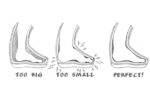The most crucial time for your new leather boots is the break-in period, when your boots need utmost care.
And…
This is the time when you fall into temptation to oil your boots so that the break-in process becomes faster and easier.
You should NOT oil your brand new boots at least before the break-in period. Once your leather boots have lost its shine, become dry and stiff, it is then you should oil your boots. Wait at least one week before oiling your new boots. When you oil your new boots, they will definitely break-in quickly, but at the cost of getting sloppy too fast.
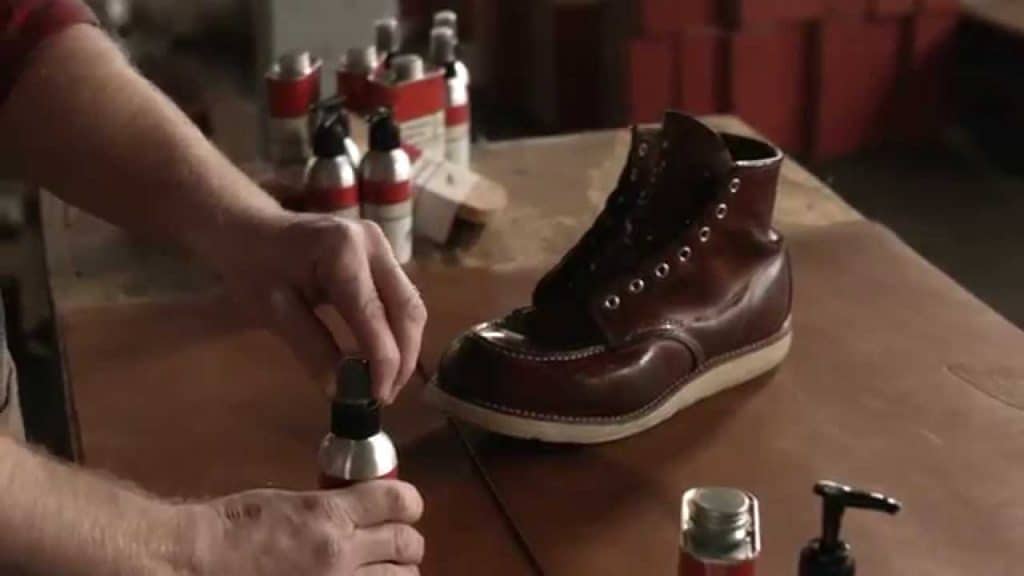
The other thing which might happen is the leather fibers would get too much drenched in oil and get damaged for the lifetime.
But…
If you want to know which is the best time to begin oiling and the best oils to use for your leather boots, just head on downwards this article because…
Today I am going to tell you all about oiling leather boots, the hacks and types of oils best suited for your leather boots.
What is the perfect time to begin oiling the leather boots?
You can begin oiling your leather boots just a few days after they have completely broken-in because this is the time when the leather fibers will have no more danger from oils.
To be very specific, you can begin oiling your boots just 4-5 days or 80-100 hours after the break-in is done to start with the preservation process.
What kind of Oil Should you put on Leather Boots?
Obviously you don’t want to cook or deep fry your leather boots, right?
So, avoid any oil that is heavy or sticky or else they will settle in the pores and fibers of the leather and damage them entirely. They will create a cast of oil on the leather which would be very difficult to take off.

Therefore, you should always go for the oils which are non-sticky and get absorbed instantly leaving behind just the shine. Oils such as mink oil, obenauf oil are good options for your leather boots. The oils should have the following features:
1.) Waterproofing Feature:
Other than giving shine, the next work of oil for your leather boots is to provide waterproofing against water, snow salt and perspiration stains. For this, the oil should have ingredients such as pine pitch and beeswax.
2.) Conditioning:
The oil should be effective enough to provide conditioning for a long period in one single application. It should be from a good brand read the reviews carefully before selecting the oil.
3.) Natural blend and non-toxic oils:
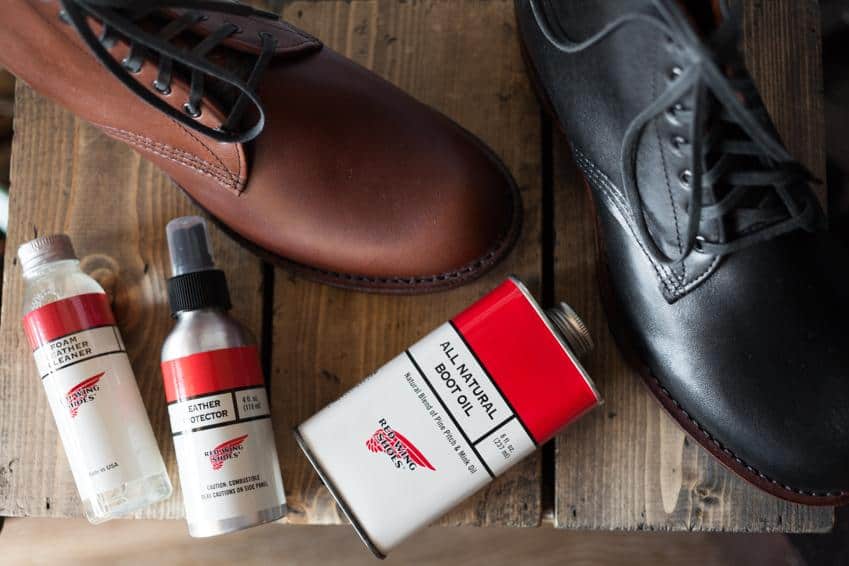
Chemical or toxic blends can ruin the natural fibers of the leather and decrease its lifespan. So, go for the oils which are natural blend.
4.) Light-weight and non-sticky:
The oil should be very light textured and non-sticky. Or else, it will make the leather fibers drenched in it and never come off completely, ultimately ruining your leather boots forever.
How often should you oil your boots?
Oiling your leather boots should be preceded by cleaning them otherwise dirt and grime will settle in the fibers of the leather and end up getting your boots even dirtier. You may clean your boots using soap water or saddle soap.
The oiling process should begin after the cleaning is done.
Now the question is, do you clean your boots every day?
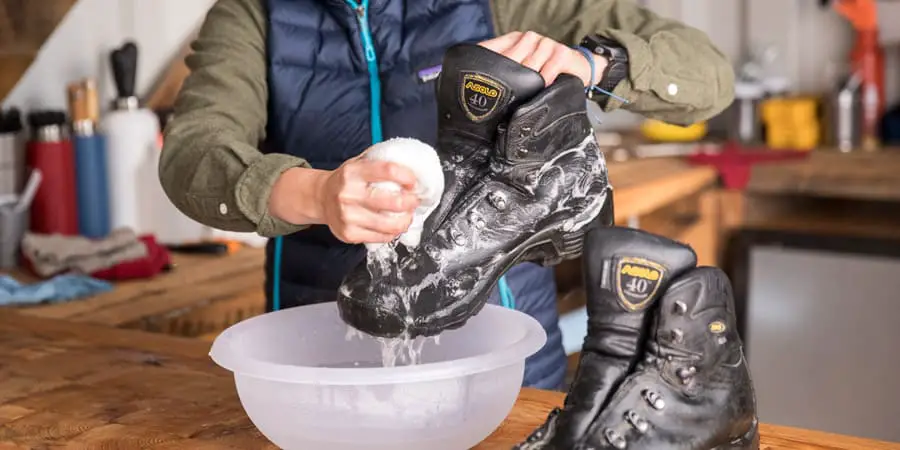
Not really, right?
So, is the oiling! It can be done once a week or in case of severe accumulation of dust, you can do the cleaning and oiling twice a week and no more than that.
Is olive oil and coconut oil good for leather boots?
Though they are very great for your leather boots, but using them won’t damage your leather boots and can work fine if used in the right way and in the right quantity.
Is olive oil good for leather?
Olive oil is a bit heavy oil so you should be very careful on what type of leather you are using them. You can apply olive oil on the leather where neatsfoot oil is recommended like heavy or tooled leather.
But it is not advisable to use olive oil on fine leathers such as top grain and full grain leather boots.
Is coconut oil good for leather?
It is absolutely okay to use coconut oil on your leather boots, provided the atmosphere around is warm.
But if you live in cold regions, people often complain of coconut oil leaving a white cast on their leather boots. In such cases, you should use coconut oil by following the simple steps below:
1.) Clean your leather boots off dirt
2.) Take the coconut oil in a pan and heat it in order to melt the coconut oil
3.) Take a microfiber cloth and start applying the coconut oil on the boots by massaging the oil in small circular motions
4.) Allow the oil to sit in the boots for some time
5.) If you feel that the oil has left a white cast on the boots, heat the boots using the hair dryer. This will again melt the coconut oil on the boots
6.) Now using another microfiber cloth, rub off the excess oil from the boots
7.) Use a horsehair brush to buff the leather and you are done
Know more about the use of coconut oil on leather boots.
Which Oil is the Best for Leather Boots?
1.) Natural blend specialized oils:

Specialized oils such as Obenauf oils,Red Wing Heritage All Natural Boot Oil contain natural preserving oils, beeswax, pine pitch and propolis which nourish your leather fibers without making any damage to them, thus increasing their lifespan.
Beeswax and propolis provide waterproofing effect and natural oil blend nourish the leather fibers from the roots and protect, shine and condition them for the better.
2.) Animal oils:
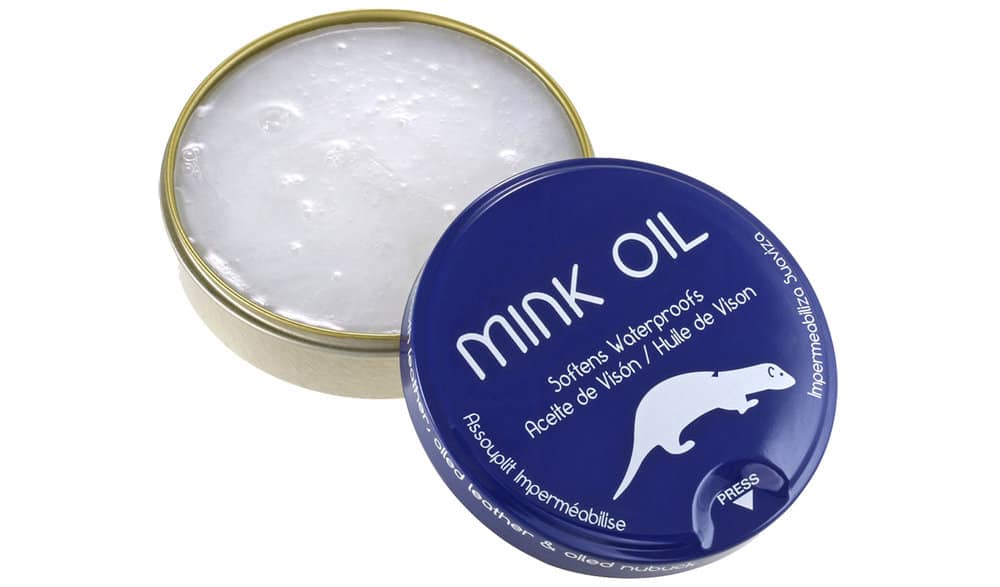
Animal oils such as mink oil is a good and cheap alternative to specialized oils which have quite similar properties and protect and condition the leather boots in a similar way.
How to apply boot oil on leather boots?
1.) Clean your leather boots using soap water or saddle soap using a wet cloth.
2.) Dry them using a dryer.
3.) Then take the minimum amount of oil on a piece of lint free cloth and work in small circular motions on the leather.
4.) Next, take a dry cloth and take off the excess oil from the boots.
5.) Dry them using a dryer.
Is oil good for leather boots?
Oil is definitely good for leather if you use the right one in the right process and at right time intervals!
Oil has several advantages on your leather boots such as:
→ Oil helps to moisturize the leather fibers
→ It helps to condition the leather and bring back its lost nutrients
→ It helps to soften the leather boots
→ It prevents cracking of the leather
→ It replenishes the dull look of the leather and brings back the shine and luster of the leather
→ It makes the leather boots more flexible
→ It makes the leather durable
→ It saves the leather from drying, cracking and also from breaking apart
→ It darkens the color of faded leather (only some oils like neatsfoot oil, mink oil)
→ As oil is derivative of fats, so it makes the leather smooth, soft, and supple
Can you oil your boots too much?
Nothing of too much is good and is oiling!
Too much oiling say more than twice a week will only clog the pores of the leather, making it lose its breathability and will add unnecessary moisture to the leather fibers which might lead to permanent damage of the leather boots.
In other sense, you should also not use excess oil than required at once. If your boots soak in excess oil, it will become sloppy and will develop bacteria and fungi in it.
Therefore, once you have applied oil, allow it to soak in the boots for few hours and then using a microfiber cloth, remove the excess oil from the boots.
When to Oil Your Leather Boots?
Over the period of time leather starts to lose its natural oils after being exposed to dirt, water, sun, grime, etc and become dry, lighten in color and begin to crack.
This is the time when you need to start oiling your boots (obviously before the cracking begins) and as soon as you feel that your leather boots have started to dry.
Let’s find out in details what are the signs that tell you to begin oiling your leather boots:
1.) When your leather boots begin to lighten in color:
As leather starts to lose its natural moisture it starts to lighten in color automatically. This is a sign you should know that your boots need oiling to replenish the moisture. Oiling also helps to darken the color of faded leather.
2.) When your leather boots become dry:
When you see dry patches or white patches on the leather, the leather start to develop creases, you should know it’s time begin oiling your leather boots. Oiling acts like conditioning for the leather fibers and makes the leather soft and supple.
3.) When your leather boots become stiff or less flexible:
After a certain period of time, you feel that your boots have become stiff or you are not able to move your feet flexibly inside the boots. The boots will crack if you try to put pressure and bend it during work.
When your leather boots reach this point, you should oil them because oiling helps to loosen the leather fibers, make them nourished and as a result makes the leather boots more flexible and durable.
4.) When you see small cracks appearing on your leather boots:
This is high time that you should add a good oil to your boots because once it has your leather boots have developed cracks, it means that it has lost its durability and if you don’t oil them now, you are going to lose your hands on them forever.
Cracks means your leather is devoid of moisture and nourishment for quite a long period of time.
5.) When it has lost its shine and luster:
This is the first sign that tells you that you should begin with the oiling process. Leather loses its shine when it is full of dirt and becomes dry somewhat. So, clean your boots and oil them to return the shine and luster to the leather boots.
Before we say Good Bye:
So, at last we would like to conclude by telling that don’t fall under temptations.
The things that seem to attract in the first sight might be damaging for the future.
Therefore,
Be very careful while choosing the right oil for your leather boots and begin oiling them at the right time.
Hope I could answer all your queries in this article, still, if you have any further questions, feel free to ask them in the comment section below.
Till then…
Take care…
And…
Keep walking!





